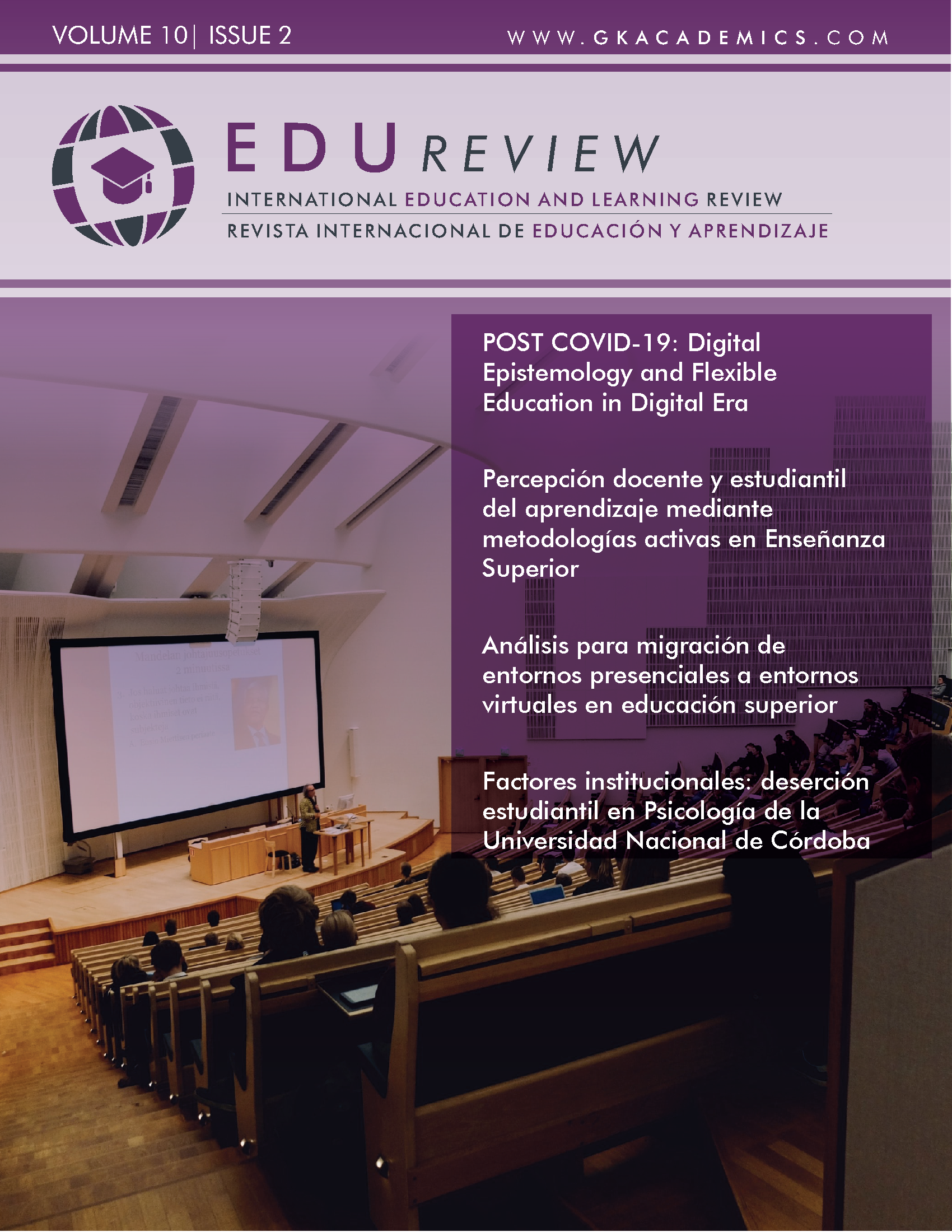Study of the Schemes Constructed of Ratio and Proportion by Pre-university Students
Using a Teaching Sequence
DOI:
https://doi.org/10.37467/gkarevedu.v10.3339Keywords:
Cognitive process, Reflective abstraction, Student, High School, Learning, Ratio, ProportionAbstract
The cognitive action carried out by the student when making use of mathematical concepts in contexts other than the one learned implies the reconstruction of them. This action represents a major difficulty faced by students. The concepts of ratio and proportion were worked on, through a teaching sequence, with a sample of 35 first-semester high school students in Mexico City, which allowed observing the reconstruction of their schemes, supported by the theoretical framework of Reflexive Abstraction. proposed by Piaget. The students were able to argue the solution strategies used in solving problems, which resulted in the modification of their actions.
Downloads
Global Statistics ℹ️
|
381
Views
|
164
Downloads
|
|
545
Total
|
|
References
Alfaro-Carvajal, C. & Fonseca-Castro, J. (2016). La teoría de los campos conceptuales y su papel en la enseñanza de las matemáticas. Uniciencia, 30(1), 17-30. DOI: https://doi.org/10.15359/ru.30-1.2
Buforn, Á., Llinares, S., & Fernández, C. (2018). Características del conocimiento de los estudiantes para maestro españoles en relación con la fracción, razón y proporción. Revista mexicana de investigación educativa, 23(76), 229-251.
Colina, M., & Valdivé, C. (2016). Estudio de los esquemas conceptuales asociados a la evolución histórica de las definiciones de razón y proporción.
Colina, M. y Valdivé, C. (2018). Las definiciones de razón y proporción: Parte I La historia. Premisa, 20(78), 5-21.
Chaverra, R.C. (2017). Resignificación del uso de las nociones de razón, proporción y proporcionalidad con estudiantes del grado séptimo (12 – 17Años). [Tesis de Maestría]. Universidad de Medellín, Colombia.
Dubinsky, E., Arnon, I., Cotrill, J., Oktac, A., Roa, S., Trigueros, M., & Weller, K. (2014). APOS Theory.
Fraisse, P. (1963). The psychology of time. Harper & Row.
Freudenthal, H. (1983). Didactical Phonomenology of Mathematical Structures. D. Reidel Publishing Company
González-Rojas, D., Roa-Fuentes, S. (2017). Un esquema de transformación lineal: construcción de objetos abstractos a partir de la interiorización de acciones concretas. Enseñanza de las ciencias: revista de investigación y experiencias didácticas, 35(2), 89-107, https://raco.cat/index.php/Ensenanza/article/view/324224 DOI: https://doi.org/10.5565/rev/ensciencias.2150
Instituto Politécnico Nacional. (2019). Programa de estudios de la Unidad de Aprendizaje de Álgebra. CECyT Miguel Othón de Mendizabal, Ciudad de México: IPN.
Ivars, P., & Fernández, C. (2016). Problemas de estructura multiplicativa: Evolución de niveles de éxito y estrategias en estudiantes de 6 a 12 años. Educación Matemática, 28(1), 9-38. DOI: https://doi.org/10.24844/EM2801.01
Llinares, S., Fernández, C. y Sánchez-Matamoros, G. (2016). Changes in how prospective teachers anticipate secondary students’ answers. Eurasia Journal of Mathematics, Science & Technology Education, 12(8), 2155-2170. DOI: https://doi.org/10.12973/eurasia.2016.1295a
Moreno, R., Mayorga, R., & Guacaneme, E. A. (2017). Perspectivas teóricas de la razón, la proporción y la proporcionalidad como relaciones de comparación, En REDUMATE, Red de Educación Matemática de América Central y El Caribe (Ed.), II Congreso de Educación Matemática de América Central y El Caribe (pp. 1-8). Comité Interamericano de Educación Matemática.
OECD. (2018). OECD Programme for Intenational Student Assessment (PISA). OECD. http://www.oecd.org/pisa
Piaget, J. (1967). Psicología de la Inteligencia (2ª Ed.). (J. C. Foix, Trad.). Crítica
Piaget, J. (1971). Problemas del Tiempo y la Función. En J. B. Grize, N. Bogaert-Rombouts, N. Meylan-Backs, F. Orsine, J. Piaget, K. Henry (Ed.), La Epistemología del Tiempo. (pp. 157). El Ateneo.
Piaget, J. (2001). Studies in Reflecting Abstration. (R. L. Campbell, Ed.). Psychology Press.
Piaget, J. & Inhelder, B. (2015). Psicología del niño (J. Delval, y P. Lomeli, Trads.). Ediciones Morata.
Rogemma, R. (2017). Research by Design: Proposition for a Methodological Approach. Urban Sci. 1(2), https://doi.org/10.3390/urbansci1010002 DOI: https://doi.org/10.3390/urbansci1010002
Serrano, C. B., (2017). Propuesta didáctica para la enseñanza de proporcionalidad a estudiantes de grado séptimo haciendo uso del aprendizaje significativo en diversos contextos. [Tesis de maestría]. Universidad Nacional de Colombia. Bogotá, Colombia.
Downloads
Published
How to Cite
Issue
Section
License
Those authors who publish in this journal accept the following terms:
-
Authors retain copyright.
-
Authors transfer to the journal the right of first publication. The journal also owns the publishing rights.
-
All published contents are governed by an Attribution-NoDerivatives 4.0 International License.
Access the informative version and legal text of the license. By virtue of this, third parties are allowed to use what is published as long as they mention the authorship of the work and the first publication in this journal. If you transform the material, you may not distribute the modified work. -
Authors may make other independent and additional contractual arrangements for non-exclusive distribution of the version of the article published in this journal (e.g., inclusion in an institutional repository or publication in a book) as long as they clearly indicate that the work was first published in this journal.
- Authors are allowed and recommended to publish their work on the Internet (for example on institutional and personal websites), following the publication of, and referencing the journal, as this could lead to constructive exchanges and a more extensive and quick circulation of published works (see The Effect of Open Access).













